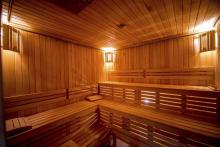Regular sauna bathing was associated with improved hemodynamic function, including significantly reduced risk of sudden cardiac death, fatal coronary heart disease, fatal cardiovascular disease, and all-cause mortality, according to a study published in JAMA Internal Medicine.
Lead investigator Tanjaniina Laukkanen of the University of Eastern Finland, Kuopio, and her associates examined data from a prospective cohort study with 2,315 middle-aged men from eastern Finland (JAMA Intern. Med. 2015 Feb. 23 [doi:10.1001/jamainternmed.2014.8187]). They found that the risk of fatal coronary heart disease events was 23% lower for two to three sauna bathing sessions per week and 48% lower for four to seven sauna bathing sessions per week, respectively, when compared with just one sauna bath per week. Both differences were significant.
Frequency of sauna bathing, but not duration, was also inversely and significantly associated with all-cause mortality, with a 40% reduction among those with four to seven sessions per week.
Though the physiological effects of sauna bathing on cardiovascular health can vary considerably, the researchers noted that the increased heart rate and higher cardiovascular output observed during sauna bathing is physiologically similar to the cardiovascular benefits achieved through low- and moderate-intensity physical exercise training.

